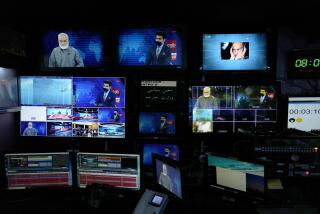Venezuela Places Limits on TV, Radio Broadcasts
CARACAS, Venezuela â Set to music befitting an action movie, the promotional ad for broadcaster Globovision recounts some of the events that have shaken this country since President Hugo Chavez came to power six years ago: a coup attempt, soldiers firing on demonstrators, a strike that crippled the nation and a recall vote that divided it.
Those images are now barred from the airwaves, as are all news clips depicting unrest or confrontation, whether live or edited, domestic or foreign.
The National Assembly has passed new regulations on Venezuelan media that restrict the broadcasting of scenes of vulgarity and violence, words or images that âcause anguish,â or information or commentary that the legislation says could defame public officials or harm national security. A new, 11-member Responsibility Directorate will determine infractions and punish them with fines, prison time and revocation of licenses.
The new controls on television and radio, which critics denounce as censorship, have compelled broadcasters to hold back news that government watchdogs may deem offensive, from footage of the Asian tsunami disaster to almost all the images out of Iraq. Under the new provisions, such scenes can only be shown after 11 p.m. and inadvertent live broadcasts of violence cannot be repeated.
âThis is a perfect instrument to censor our programs or close the network,â said Ana Cristina Nunez, legal consultant for Globovision, the countryâs only all-news channel and a counterweight to the government mouthpiece Venezolana de Television. âBecause the law is so vague and open to interpretation, there will always be the possibility to say we breached some rule. Most news has some violent element.... We believe this law censors information that adults have the right to watch.â
Three other private networks -- RCTV, Venevision and Televen -- have edited out sex scenes and graphic violence from soap operas and sitcoms. But the law has most strongly affected the way TV news is presented, as station managers self-censor their coverage, ever mindful of the new directorate.
Chavez loyalists, including lawmaker Desiree Santos Amaral, who helped draft the broadcast law, defend the changes as long-overdue steps to clean up the airwaves.
âTelevision needs to serve the interests of families,â she said, claiming scenes of gore and violence from news events can have a detrimental effect on children. She pointed to the Sept. 11 attacks as an example of distressful violence that she believed shouldnât be shown on TV.
âThere should be respect for audience sensitivities,â Santos Amaral said. âViewers shouldnât have to look at corpses.â
But the legislative moves have also drawn censure from international democracy advocates and groups such as the Organization of American States of which Venezuela is a member.
Late last year, before the legislature gave its final endorsement to the Law on Social Responsibility in Radio and Television, the OASâ Inter-American Commission on Human Rights wrote to Chavez expressing concern that the law violated member nationsâ collective commitment to free expression and âlimits the flow of information on matters of public interest.â
Press freedom watchdogs such as the Committee to Protect Journalists in New York have also expressed unease at the restrictions, which will take effect here at staged intervals over the next five months. âThe lawâs broad language could be used to muzzle the private media and impose censorship,â Ann Cooper, the groupâs director, wrote in a letter to Chavez last month.
During her confirmation hearing before the U.S. Senate, Secretary of State Condoleezza Rice singled out Chavez for criticism. âSome of the steps heâs taken against the media, against the opposition, I think are really very deeply troubling,â she said.
The broadcast responsibility law will fundamentally change the nature of programming for stations such as Globovision.
By the end of March, all broadcasters, whether devoted to news, sports, weather or marketing, have to carry at least three hours of programming for children. By July, they must offer at least 5 1/2 hours of âindependently produced programming,â content they must buy from a government-approved list of suppliers.
All licensed networks are already obliged to carry the governmentâs direct feeds on events deemed of essential public importance. Station owners complain that the feeds -- including long presidential and parliamentary addresses and official ceremonies marking military holidays and Chavezâs birthday -- already exceed what would be considered vital in more democratic societies.
The independent content provisions are intended to âdemocratizeâ the airwaves, said William Castillo, deputy minister for communications and information.
âVenezuelan society has felt for the past 30 years that a new law was needed. The influence of the broadcast media over the world of politics is direct and substantial,â Castillo said.
At the National Telecommunications Commission, known as Conatel, director Alvin Lezama said officials of the government regulatory agency believed the legal changes were necessary because some stations, particularly those that were privately owned, had the power to monopolize content and âdidnât reflect society.â
Conatel, which employs more than 500 people, will be the licensing agency for the new programming.
Primero Justicia, an opposition political alliance, plans to challenge the media regulations in the Inter-American Court of Human Rights, said lawmaker Gerardo Blyde. The group will also appeal to the Venezuelan Supreme Court, even though the latter has just been packed with pro-Chavez judges, he said.
âWe have conventions on human rights that we have signed,â Blyde said.
Lawmaker Santos Amaral accused private broadcasters of taking a pro-opposition editorial line and promoting violence against the government.
As for complaints that the lawâs language was too vague to give broadcasters a clear idea of what constituted violence or anguish, the lawmaker smiled and repeated what was famously said about pornography: âThey know it when they see it.â
More to Read
Sign up for Essential California
The most important California stories and recommendations in your inbox every morning.
You may occasionally receive promotional content from the Los Angeles Times.











